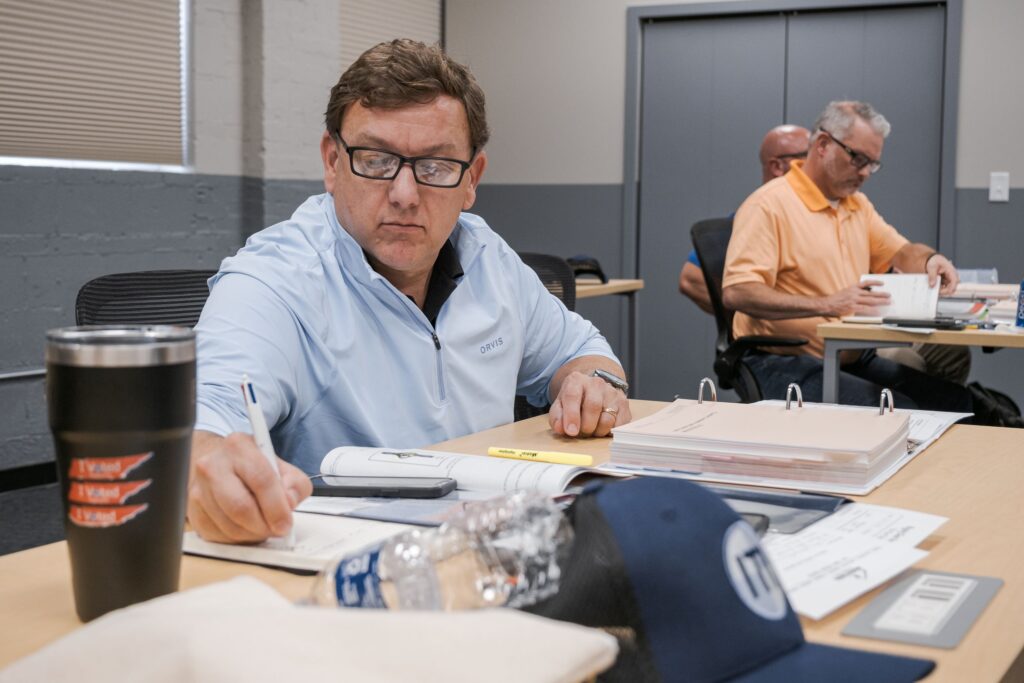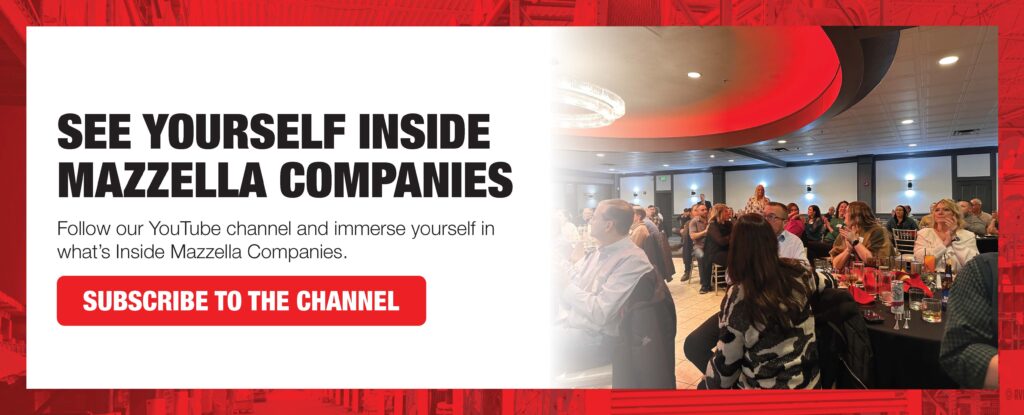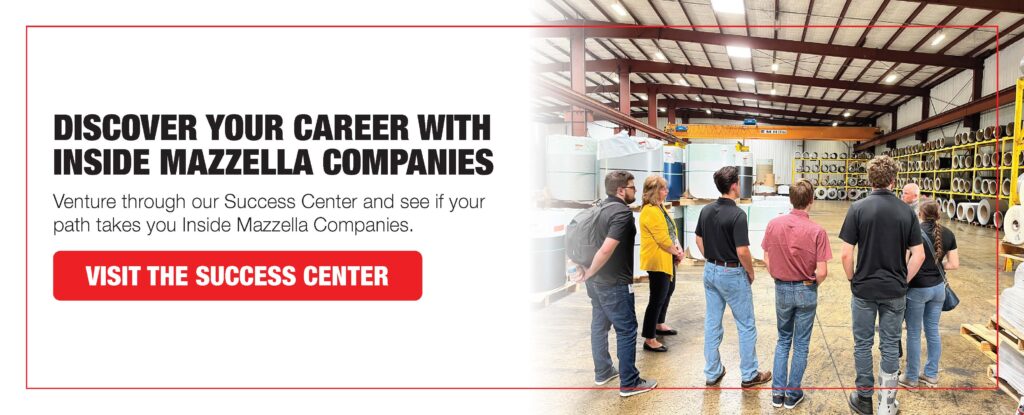According to a recent SHRM article, many employers are eliminating education requirements as only one-third of working-age adults have a bachelor’s degree. At Mazzella Companies, a college degree is not mandatory. Work experience and being a Lifelong Learner ready to stay ahead of the curve account for a lot. However, you may still feel drawn to advancing your career goals by obtaining a degree. Both options have pros and cons, depending on your situation, interests, and aspirations.
In this article, you will learn the top five things to consider when choosing between the two paths and how they can affect your career outcomes. You will also hear from Mazzella Companies’ staff, who are experts in their fields and will share their insights and expertise to guide you on your journey.
Ashley Shuey, Quality Program Manager and College Graduate
Greg Wilder, Service Manager and Apprenticeship Graduate
Sue Barstow, Sr. Regional HR Business Partner
Candice Gouge, Director of Lifelong Learning
1. Duration of Study
The duration of study timeframes for college degrees and certifications can vary widely depending on the level, program, and institution. Generally, degrees take longer than certifications, ranging from two to seven years. Certifications can sometimes be earned in a few months to two years.
It took nearly five years for Ashley, who recently finished getting her associate degree through Mazzella Companies’ Technical Training and Education Assistance Program. “I was working full time and had a young family when I started, so I intentionally paced myself with two classes per semester. It took me several years, but there was never any pressure to complete it within a specific timeframe.”
Greg completed his Lifting Mechanic Certification in about three months. “I only had to get to the stuff not included in my previous work experience. I’ve been an electrician my whole career, and that added up. It can look a little scary to complete for some people who don’t know that work experience transfers.”
Because the Apprenticeship Program is designed to incorporate work hours as a part of the process, it can vary depending on the applicant’s work history.
Requirements:
Lifting Mechanic Program
- 8,000 hours of on-the-job training
- 400 hours of related technical instruction
- Four years for completion
Rigging Fabricator Program
- 6,000 hours of on-the-job training
- 300 hours of related technical training
- Three years for completion

2. Areas of Focus and Learning Style
Would you rather study a broad range of topics? Or would you rather focus on one area of study? Are you someone who would rather learn in a classroom setting? Or do you prefer to learn how to do your work on the job? What you want to study and what environment you study best in should be considered before taking the next step.
Ashley shared that her area of focus was geared towards her interests at work. “I tried to pick classes that would help me understand why people do what they do, the psychology of work. I wanted to learn how to build small wins into people’s day-to-day lives and make them feel respected. One of my biggest takeaways from a class was that if supplies are locked up on the production floor, we create an environment of mistrust, so I immediately changed that. I want people to feel self-confident, grow, and know they’re adults we respect.”
When asked what a day in the life of an Apprentice is like, Candice answered, “A day in the life is going out and doing your job but approaching it from a learning aspect. In many ways, it’s very transparent. You’re doing your job and learning how to do it better”.
3. Career Opportunities
Getting her associate degree opened up many more opportunities for Ashley. “I’ve been an assistant in every different way possible, whether it was for Operations, Leadership, or the Quality, Safety, Transportation, Reliability team. Getting my degree finally helped me overcome that hurdle in my current position. It was a feather in my hat to show that I’m committed to the company and its growth.”
Greg said that getting his certification affected not only his career but how he viewed the career paths of new team members. “If you’re interested in this as a career, speak up. If you can look at the whole package here and decide it’s something you want to do, that tells me where we are going in the future with you. We’re always looking for people who will put in what the company is willing to put into them.”

4. Cost
According to an article published by SHRM, more than two-thirds (69%) of students with student loans also said that debt will influence the jobs they consider upon graduation. With so many weighing their choice of careers based on education debt, it’s clear that college debt can cause potential candidates to pivot.
Candice said that participants in the Apprenticeship Program can expect no cost for anything and expect increases in their pay. “The program is free to team members. We only expect them to invest time. Once you hit program milestones, participants can expect pay increases as they move along.”
Greg said, “Deciding to get my Department of Labor (DOL) certification was a no-brainer once I found out Mazzella Companies entirely covered the cost.”
Ashley said that she knows she could not have afforded her college degree without the help of the Technical Training and Education Assistant Program. “I knew from a young age that college wouldn’t be on the table for me. While it wasn’t free, I know it would have cost me much more if I had gone it alone.”
The program Ashley used to get her degree is one of a few offered at Mazzella Companies and is graciously offered to full-time team members who have celebrated a full year at Mazzella Companies. A stipulation for the program is that team members need to apply and have their coursework approved.
Other guidelines regarding the program include:
- Pass or A = 80% of the cost of the course
- B = 70% of the cost of the course
- C = 60% of the cost of the course
- D or Fail = 0% of the cost of the course
- Students must submit a certified grade card along with receipts for tuition costs paid when requesting a reimbursement
- Reimbursement will be made no later than 30 days after required paperwork and receipts are submitted
- Team members will need to stay employed by Mazzella Companies for two or more years after receiving their final reimbursement, or they will need to pay the amount in full upon termination with the exception made for death, long-term disability, or reduction from force
- The total amount of reimbursement per year by law that will not be considered taxable income is $5,250 – anything above this amount will still be reimbursed but will be subject to regular taxation
Related: What Education Benefits Does Mazzella Companies Offer?
5. Credit Transferability
Credit transferability is the ability to transfer credits earned at one learning institution to another, usually to complete a degree or certification program. Depending on their goals, preferences, and circumstances, this can affect someone’s decision on whether they get a job certification or a college degree.
When it comes to the credits you earn, whether through getting your college education or working towards a job certification, not all credits are created equal. “There’s a good chance that some credits from our apprenticeship program will transfer as college credits – there’s no one-to-one comparison. However, many colleges will offer credit for prior experience, especially a technical college and work experience is always transferable if you decide to participate in our apprenticeship program.”
Conclusion
Whether searching for a new career path, facing a tough job market as a college student, or being eager to advance your skills, you may wonder what kind of education will best serve your goals. Different learners may opt for other forms of enrichment, whether a college degree or a certification. However, the benefits of pursuing higher education and being a Lifelong Learner are universal. Enhancing your knowledge and abilities can boost your confidence, broaden your options, and increase your income potential.

